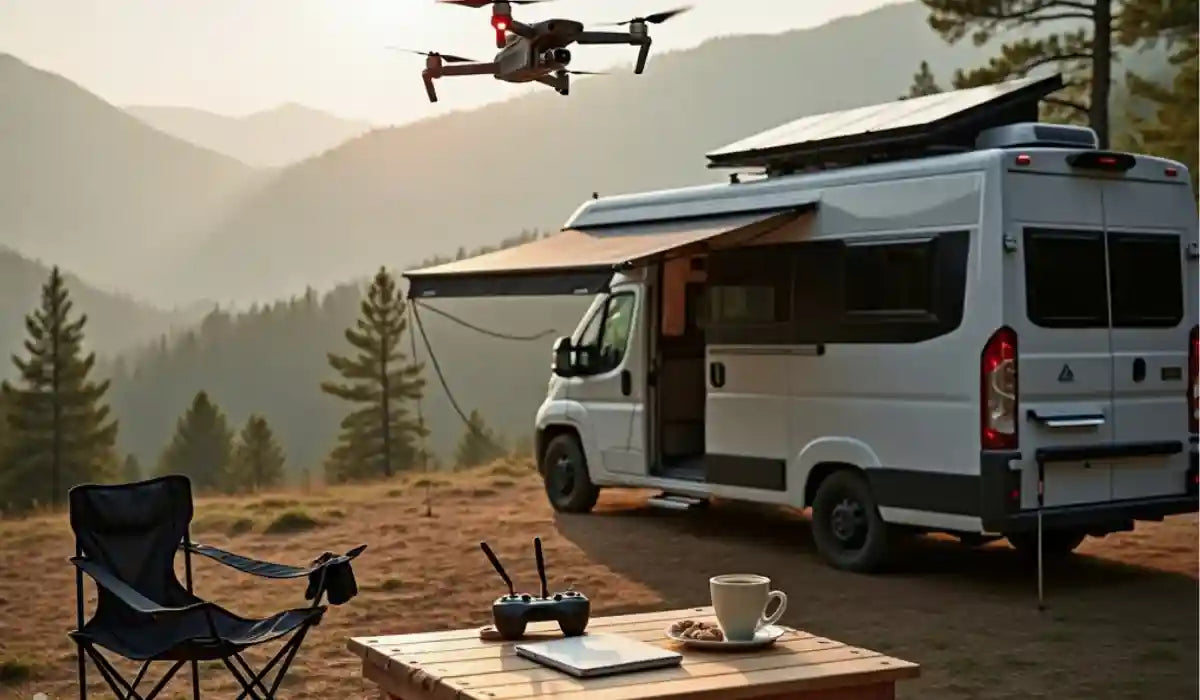Introduction: Why RV Travelers Need Reliable Power
In the realm of outdoor adventures, the need for dependable energy solutions has never been greater. Whether you're embarking on weekend camping trips or embracing a full-time RV lifestyle, having a portable generator for RV trips ensures that you maintain the comforts of home on the road. This guide explores the essentials of choosing the best generator for RV use, focusing on reliability, efficiency, quiet performance, and eco-conscious design.
Understanding RV Power Needs
How Much Power Does a 30 Amp RV Require?
Most RVs are equipped with a 30 amp electrical system, capable of handling up to 3,600 watts.【RVIA - Recreational Vehicle Industry Association】 This capacity supports essential appliances like air conditioners, microwaves, refrigerators, and entertainment systems. When selecting a portable generator, ensure that its running and peak wattage align with your RV’s requirements.
Why a Portable Generator Matters
It provides the flexibility to power your RV even in remote areas where hookups aren’t available. This ensures that you can run air conditioning during hot days, keep food fresh in the refrigerator, and stay connected through laptops and mobile devices. For adventurers who value independence, it transforms your RV into a self-sufficient home.
Quiet Generators for RV Camping
Noise Pollution Concerns
Noise is one of the most common complaints in campgrounds. Traditional generators can reach 80–90 dB, which is comparable to a lawnmower. A quiet generator for RV camping, however, operates around 50–60 dB, similar to a normal conversation.
Inverter Technology for Silent Power
Modern inverter generators incorporate sound-dampening insulation and advanced mufflers, drastically reducing noise output. They not only protect the peaceful ambiance of nature but also provide clean, stable power suitable for sensitive electronics. This makes them the preferred choice for RV travelers who want both quiet operation and reliability.
Key Features to Look for in a Portable Generator
Portability and Convenience
Compact design, built-in wheels, and handles are must-have features for travelers constantly on the move. Many models now include remote start options, allowing users to power on the unit without stepping outside the RV.
Fuel Efficiency and Runtime
A fuel-efficient generator for RV use saves money and reduces refueling stops. Look for eco-mode settings that automatically adjust engine speed to demand. Extended runtime (8–12 hours at 50% load) ensures overnight comfort without interruptions.
Reliability and Build Quality
Durability is critical when traveling across diverse terrains and climates. Choose a reliable generator for RV road trips with a solid warranty, strong customer reviews, and proven performance in real-world conditions.
Generator Options for RV Travelers
Inverter Generators
- Pros: Clean power, quiet, fuel-efficient, lightweight
- Best For: Tech-savvy RVers running laptops, smartphones, TVs
- Example: ERAYAK 4500PD Dual Fuel Inverter Generator
Dual Fuel Generators
- Pros: Flexibility of gasoline and propane, extended runtime, eco-friendly option
- Best For: Long trips in remote areas with limited fuel options
Standard Portable Generators
- Pros: Higher wattage, affordable
- Cons: Louder, less fuel-efficient
- Best For: Large appliances and heavy loads in big RVs
Environmental Considerations
Emissions Standards
Eco-conscious travelers should look for models compliant with EPA and CARB standards. Generators that meet these standards emit fewer pollutants, making them safer for campgrounds and protected areas.
Sustainable Practicesp
Using propane or dual fuel models reduces carbon footprint. Pairing a generator with solar panels or battery storage can further minimize environmental impact while extending off-grid capabilities.
Maintenance and Longevity
Regular Care
- Change oil after the first 20–30 hours of use
- Clean or replace air filters regularly
- Inspect spark plugs and connections
Storage Best Practices
Store your generator in a dry, ventilated space. Use fuel stabilizers during long-term storage and consider protective covers to prevent dust and debris buildup.
FAQ: Portable Generators for RV Trips
Q1: What size generator do I need for a 30 amp RV?
A 30 amp RV requires up to 3,600 watts. Choose a generator that provides at least 3,500 running watts to handle essentials like an AC unit and microwave simultaneously.
Q2: Are inverter generators worth it for RV use?
Yes. Inverter generators are quieter, more fuel-efficient, and provide clean power safe for electronics. They are the best generators for RV camping where noise and sensitive devices matter.
Q3: Can a generator run an RV air conditioner?
Yes, but it must provide sufficient starting watts—typically between 2,800 and 3,500W. Always check the specific surge requirements of your RV’s AC unit before purchasing to ensure compatibility.
Q4: What’s the benefit of a dual fuel generator for RV trips?
Dual fuel models allow you to switch between gasoline and propane. Propane burns cleaner and stores longer, while gasoline provides higher power output.
Q5: How do I reduce noise from my generator while camping?
Choose a quiet inverter generator, position it away from the RV and sleeping areas, and consider sound barriers for extra noise reduction.
Conclusion: Power Your RV Adventures with Confidence
A portable generator for RV trips is more than just a power source—it’s a gateway to freedom, comfort, and peace of mind on the road. By choosing the best generator for RV use, focusing on quiet operation, fuel efficiency, and eco-friendliness, you can travel further and stay longer in remote locations. Whether you opt for an inverter model, dual fuel flexibility, or a high-capacity portable unit, the right generator ensures your RV lifestyle remains convenient and enjoyable.
👉 Ready to explore? Check out our full collection of portable inverter generators.






